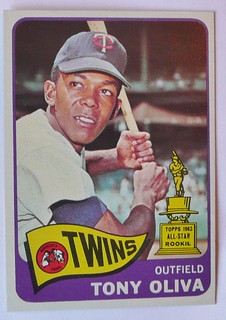Landon Evanson, who writes for Bugs and Cranks offered invaluable input to the process of selecting this team. In fact, he probably saved me from making a couple head-scratching mistakes due to not placing enough emphasis on the players who led the Twins to their most recent glory.
Franchise History
Minnesota Twins (1961- )
Washington Senators (1901-1960)
An asterisk (*) denotes a Hall of Famer.
Starters
C - Joe Mauer (2004- )
1B - Kent Hrbek (1981-1994)
2B - Rod Carew* (1967-1978)
SS - Joe Cronin* (1928-1934)
3B - Harmon Killebrew* (1954-1974)
LF - Goose Goslin* (1921-1930, 1933, 1938)
CF - Kirby Puckett* (1984-1995)
RF - Tony Oliva (1962-1976)
Moving Killebrew to third base to accommodate Hrbek in the starting lineup seems like a logical move, as the other options at third are nowhere near as good as Hrbek.
There are three Hall of Fame outfielders on this team, but the lesser of the three gets moved to the bench (see below) in favor of Oliva, a guy whose name comes up more than occasionally in discussions about deserving players outside the Hall. That still makes five Cooperstown inductees among this team's starters, and one more (Mauer) who, if his health holds up, could well be on his way.
Rotation
Walter Johnson* (1907-1927)
Bert Blyleven* (1970-1976, 1985-1988)
Johan Santana (2000-2007)
Frank Viola (1982-1989)
Brad Radke (1995-2006)
I'll admit I was initially going to leave Viola out of the rotation, but Landon and a couple other folks on Twitter convinced me otherwise. Looking back, I'm not really sure what I was thinking, but this is why I frequently seek input from others.
Closer
Joe Nathan (2004-2009, 2011)
Reserves
C - Earl Battey (1960-1967)
1B - Joe Judge (1915-1932)
2B - Chuck Knoblauch (1991-1997)
2B/SS - Buddy Myer (1925-1927, 1929-1941)
3B - Gary Gaetti (1981-1990)
OF - Sam Rice* (1915-1933)
OF - Clyde Milan (1907-1922)
I was going to take Eddie Yost over Gaetti, but the latter is another guy Landon lobbied for. In hindsight, I don't think Yost would have been a terrible decision, but Gaetti's place in Twins history earns him just enough extra credit to push him past the walking man.
Bullpen
Firpo Marberry (1923-1932, 1936)
Rick Aguilera (1989-1999)
Camilo Pascual (1954-1966)
Jim Kaat (1959-1973)
Relegating Kaat to the bullpen in favor of Radke might be a controversial choice, but I swear it has less to do with this idiocy than with the fact those same sabermetrics show, rather logically, that Radke's 4.22 ERA in an era when the league average was 4.64 was better than Kaat's 3.34 in a 3.58 league average era.
Manager
Tom Kelly (1986-2001)
No way I was going to opt for anyone besides the skipper who led the team to two of their three World Series wins, although a case could be made for Ron Gardenhire or maybe Bucky Harris, the latter basically because he's the franchise's all-time wins leader.
Greatest Eligible non-Hall of Famer
Kaat and Oliva appeared on the 2012 Hall of Fame Golden Era Committee ballot. Both received significant support, but fell short of the votes needed for induction, with Kaat garnering 10 of 16 votes and Oliva pulling in 8.
Kaat vs. Oliva is an interesting comparison, with Kaat's case based more on longevity, while Oliva enjoyed the better peak. Kaat has the edge in Hall Rating, 85 to 82, but that's probably too close to consider worth hanging my hat on.
I probably tend to favor longevity over peak performance, but in the case of just-below-the borderline candidates, which both of these guys are in my opinion, I sometimes have a different perspective.
While Kaat would likely be a Hall of Famer if he combined a little more peak dominance with his longevity and reached 300 wins, the fact remains he only enjoyed two seasons with an ERA+ of 130 or greater, and three more in the 125-130 range. The rest of his career he was basically an above average pitcher, albeit one who chewed up a lot of innings in the process. His accomplishments are certainly worthy of recognition, but not to the extent that Oliva's are.
Tony Oliva was a Hall of Fame player for eight years. Unfortunately, eight years of greatness does not make him a Hall of Famer, but it does offer a glimpse of what might have been.

From his age 25 to 32 seasons (1964-1971), Oliva was worth 40 WAR, and he was consistent at producing that five WAR per season, with 3.4 being the worst year in that stretch. He also hit .313/.360/.507 during that period, for an OPS+ of 140. In fact, his career OPS+ of 131 would be potentially Hall-worthy if extended over more than 6880 plate appearances.
After 1971, his career was as good as over, though. A knee injury limited his 1972 to just 10 games, and he was unable to return to form after that, putting together 3+ replacement-level seasons as a DH before calling it quits.
Next Up: New York Mets




No comments:
Post a Comment